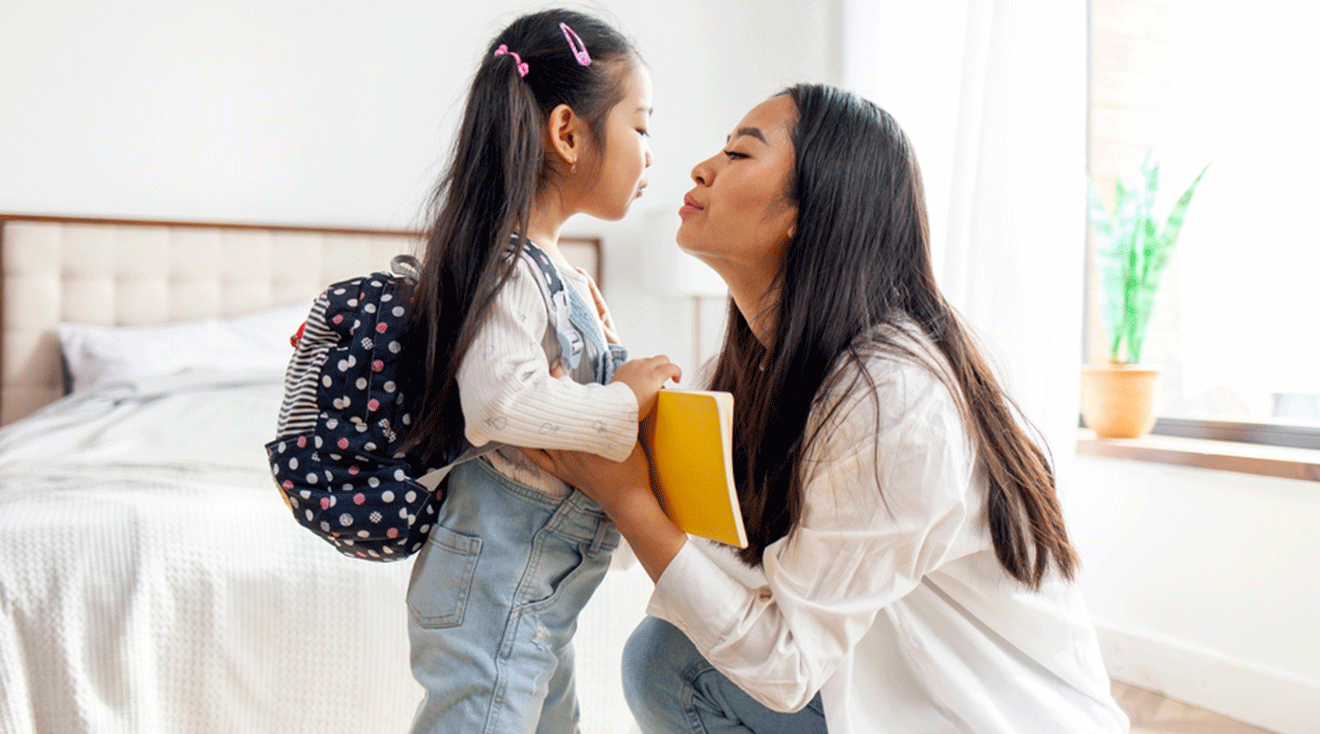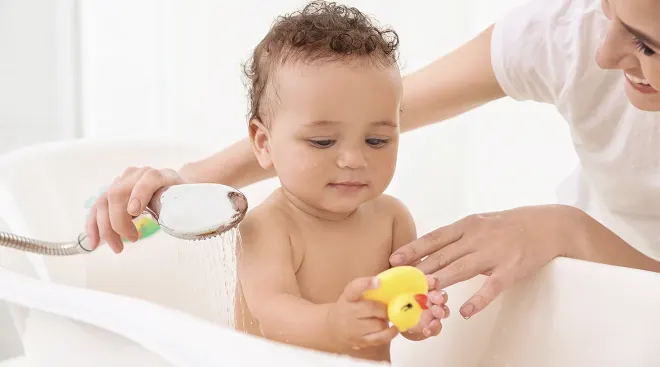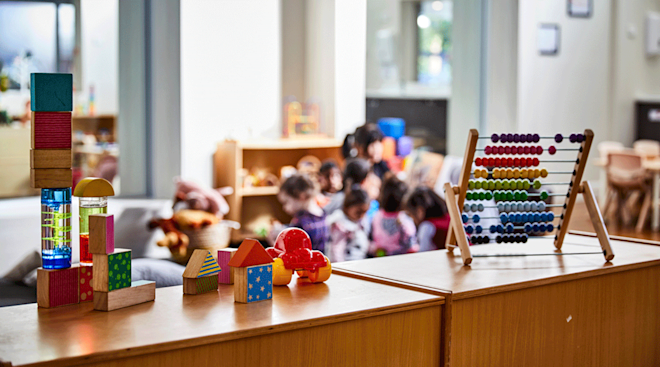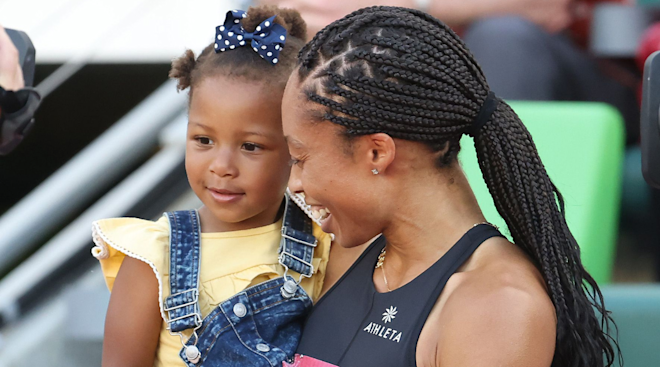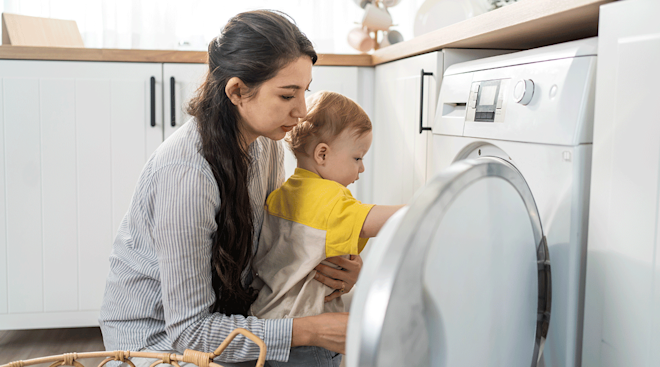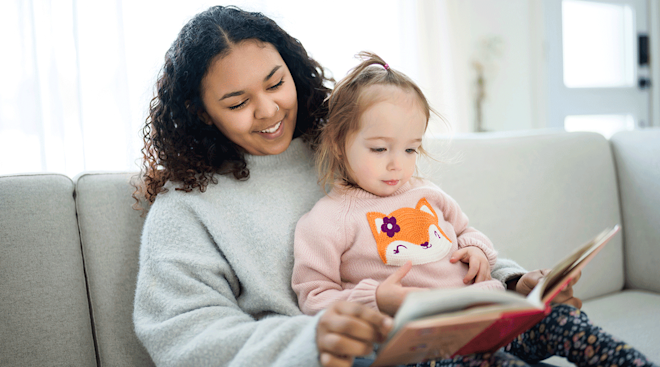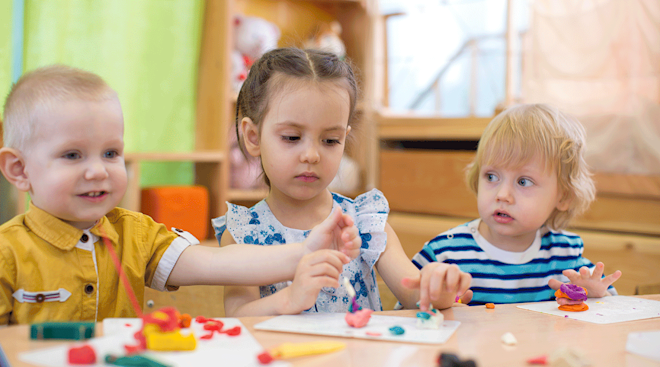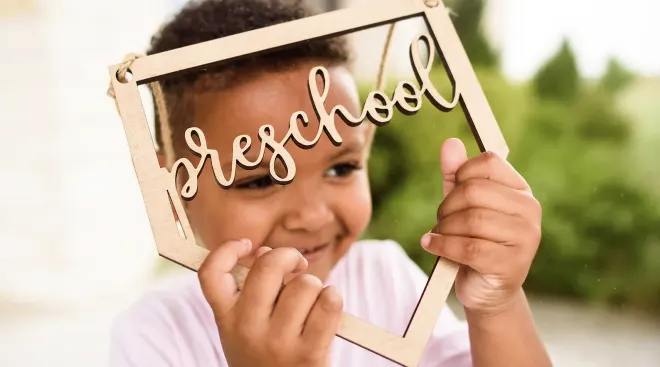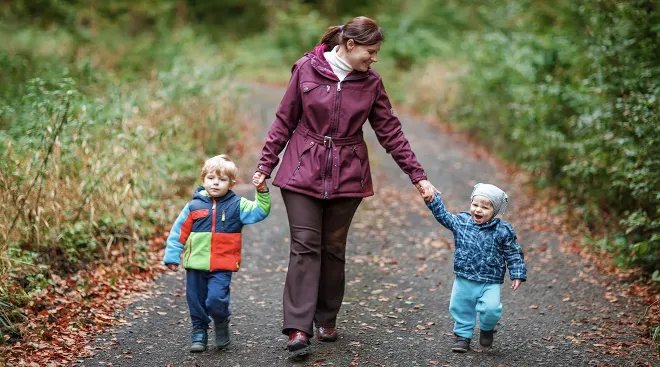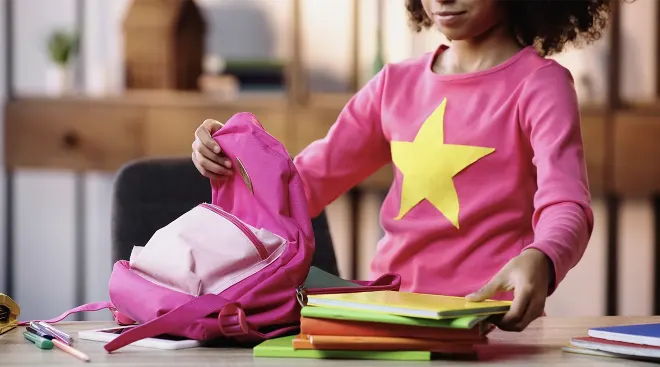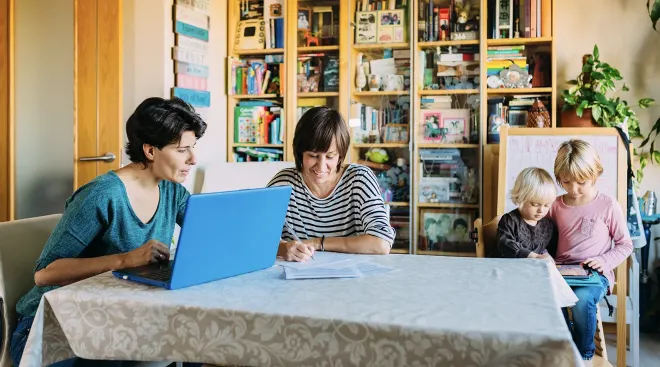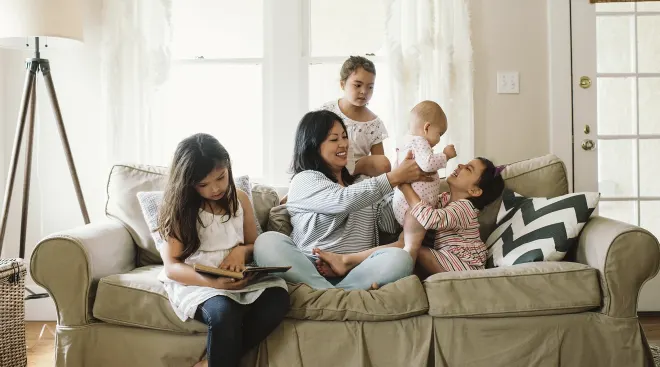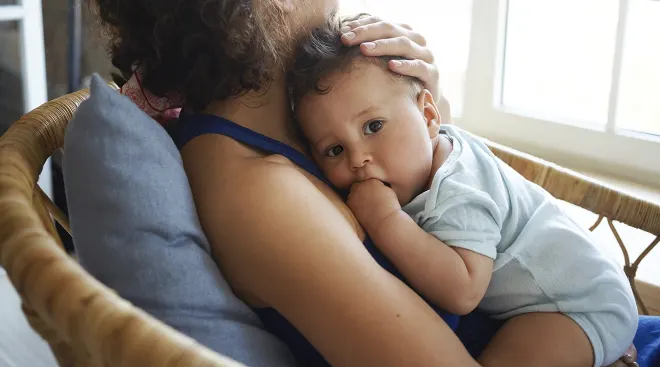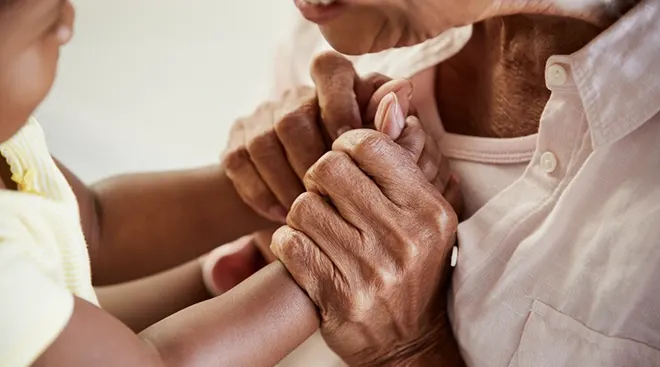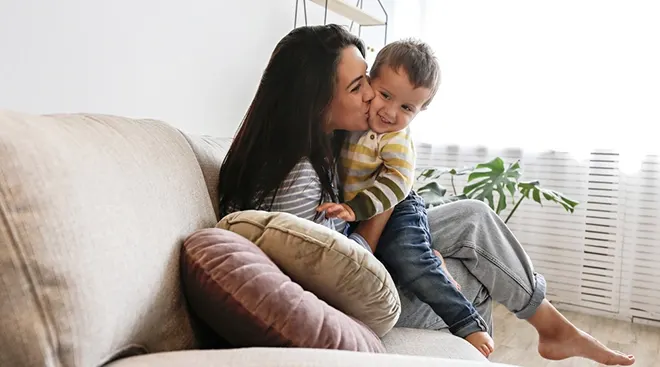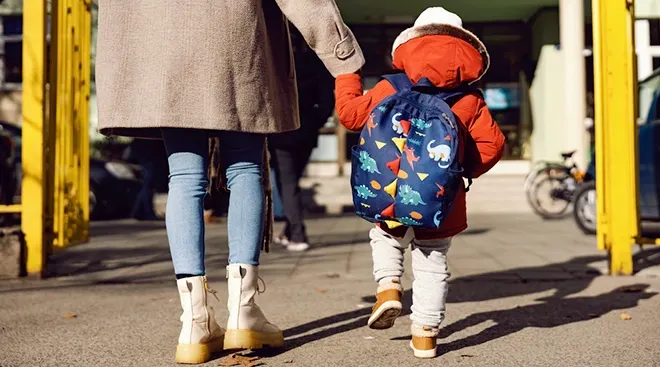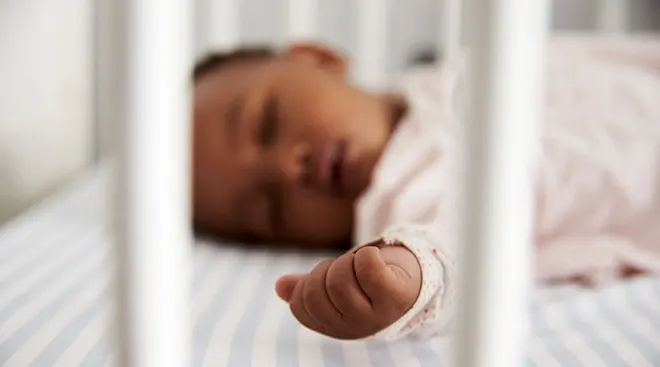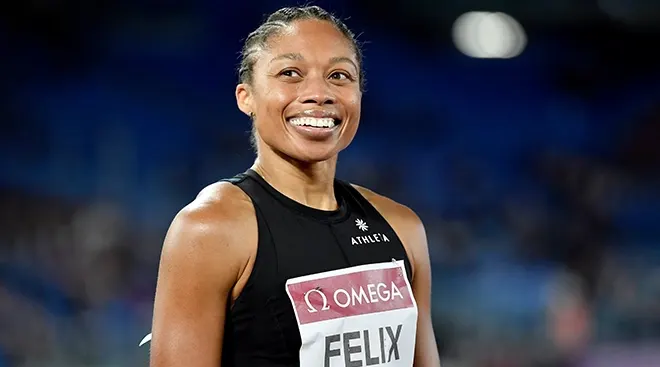Preschool Age: When Do Kids Start Preschool?
Preschool is your child’s first taste of “big kid” school, and if it’s your first child, it’s likely to be your first experience as well. Because of this, you may have lots of questions about appropriate preschool age and programs. So when do kids start preschool—and what’s the difference between preschool and pre-k? Moreover, how can you tell when your child’s ready for preschool or pre-K? Here, experts break it all down.
While the preschool age range is 2 to 4, parents often wonder if there’s an “ideal” time to start preschool. So what is the best preschool age? According to Amy Jackson, chief early learning strategy officer at Primrose Schools, “there isn’t a universal ‘best age’ to enter early education programs.” Denise Scott, MD, an Oklahoma-based pediatrician and author of Feed Your Child’s Future Health: Prevent Disease Before It Starts adds that it’s ideal to start “when a child can understand and follow directions and separates more easily from the parent.”
Ultimately, the best time for your child to start schooling will depend on your child’s individual development, your family’s needs and the types of programs available in your area, notes Jackson.
Yes, preschool and pre-k (pre-kindergarten) are similar, as both are education programs that happen prior to kindergarten, but they’re not the same. “Though they’re closely related, and the terms are sometimes used interchangeably, preschool and pre-k are distinct in purpose and age range,” says Jackson.
Preschool typically covers early childhood education for kids ages 2 to 4 and focuses more on socialization and play-based learning, explains Scott.
So what age is pre-k? It’s geared towards kids aged 4 to 5 and prepares them for kindergarten. “Pre-k often has a more structured curriculum that emphasizes academic and social readiness for school,” Jackson says.
While neither preschool nor pre-k are required for kindergarten, both are recommended by experts. “It’s important that children have developmentally appropriate learning and social experiences,” Jackson says. “While attending preschool is not mandatory, studies show that students who attend high-quality preschool programs reap lasting academic and social benefits [throughout] school and their lives.”
It’s true: Research has found that high quality early childhood education, such as preschool and pre-k, can lead to long term academic success, including attending college, as well as experiencing fewer behavioral and legal issues later in life. That said, the quality of the program is a key component in driving success, as one 2022 study found that without quality control, early childhood education programs may actually have negative effects for students later on.
As noted, preschool and pre-k programs come with many benefits. The experts note that some of them include:
- Developing emotional and social skills: “Kids learn how to interact with peers, share, and cooperate,” says Nikita Patel, MD, FAAP, a pediatrician with MD Kids Pediatrics North Cockrell Hill in Texas. They also learn how to manage and regulate their own emotions, as well as how to be empathetic towards someone else. “The inquiry and enriched play characteristic of high-quality programs are incredibly impactful in helping children grow as curious learners and good friends,” Jackson adds.
- Preps them for kindergarten: The routine and structure of going to school helps kids to prepare for going off to kindergarten and later schooling, Jackson says. It also helps build a foundation for time management and academic expectations, as well as introduces kids to the alphabet and other basic concepts in math, language and cognitive development, Patel adds.
- Introduces structure: Your tot may have been following a schedule at home, but preschool or pre-k offers a little more structure. Children learn to follow a schedule, as well as instructions like putting toys away and sitting quietly for a story. Plus, it’s good practice for “being instructed by an adult other than a parent,” Scott adds. Along with structure, kids also build self-help skills, Patel says, such as putting on their coat and using the bathroom.
When deciding when to start preschool, age shouldn’t be the only determining factor. A major component of when to start preschool is determining a child’s preschool readiness. Since each child develops at a different rate, this timeline will vary. “Some kids may thrive earlier, while others may benefit from waiting,” Patel says.
There are several developmental areas you’ll want to look at when deciding if your child is ready, regardless of a “typical” preschool age. Per the experts, these include:
- Whether your child is potty trained (this is a requirement for many preschools, Patel notes)
- Whether your child is comfortable being away from you and other primary caregivers for an extended period of time daily
- Whether your child can follow simple instructions and voice their needs
- Whether your child is interested in playing with and being around their peers
- Whether your child can emotionally self-regulate to some degree (“i.e. handling minor frustrations without major meltdowns,” Patel explains)
All that said, Jackson emphasizes looking for “preschools committed to meeting children where they’re at, not the other way around.” If you’re unsure if your child is ready or how to prepare your toddler for preschool, reach out to your pediatrician. They’ll be able to guide you.
Frequently Asked Questions
Is my 2-year-old ready for preschool?
Again, rather than looking at your kiddo’s age, you’ll want to look at their readiness signs, as well as the program’s quality. “Readiness is in many ways more about the school environment and teachers than the child—even infants can thrive in school settings, if the programming and environment are developmentally appropriate and children's unique strengths and opportunities are recognized by teachers,” Jackson says. “That said, it’s important not to rush the preschool journey.”
Is a 4-year-old still a preschooler?
“Again, specific age ranges can vary among providers and programs,” Jackson says. Scott agrees, noting that a 4-year-old may still be a preschooler or may be of pre-K age.
What age do kids start kindergarten?
Usually, kids start kindergarten at 5-years-old, but the cut-off dates can vary based on your child’s birthday, your state and individual private programs, Jackson says. “Some children may start as early as 4 or as late as 6, depending on their birthdate and developmental readiness,” Patel adds.
Are there any risks to sending kids to preschool?
The biggest risk for sending your tot to preschool is the increased potential for getting sick, Scott says. However, being exposed early may help build immunity and decrease how frequently they get sick in pre-k, kindergarten and beyond, she adds.
Additionally, your child may have a harder time starting school if they aren’t emotionally ready and have separation anxiety.
All three experts note that good quality early childhood education, like preschool and pre-k, can have several beneficial impacts. Do what feels right for your child and family. “You know your child best and are the one to decide what is the best fit,” Scott says, adding, “For working parents, preschool can be a great way to have them in a safe environment, while meeting new friends and learning new activities.”
Please note: The Bump and the materials and information it contains are not intended to, and do not constitute, medical or other health advice or diagnosis and should not be used as such. You should always consult with a qualified physician or health professional about your specific circumstances.
Plus, more from The Bump:
Amy Jackson, PhD, is the chief early learning strategy officer at Primrose Schools. She holds a doctorate in instructional leadership from Georgetown University, a master’s in curriculum from the University of Georgia, an MBA from the University of Virginia Darden School of Business and a bachelor’s in early childhood education from Nova Southeastern University.
Nikita Patel, MD, FAAP, is a pediatrician with MD Kids Pediatrics North Cockrell Hill in Texas. She earned her medical degree from Ross University School of Medicine, Dominica and completed her pediatric residency at Crozer Chester Medical Center in Pennsylvania.
Denise Scott, MD, is a pediatrician and a pediatric endocrinologist based in Oklahoma with over 30 years of experience. Certified in culinary medicine, Scott also runs the blog Feed Future Health and is the author of Feed Your Child's Future Health: Prevent Disease Before it Starts. She received her medical degree from the University of Texas Medical Branch and completed her residency at the University of Oklahoma Health Sciences Center with a fellowship at the National Institutes of Health.
Learning Policy Institute, What Does the Research Really Say About Preschool Effectiveness?, January 2019
Learning Policy Institute, Untangling the Evidence on Preschool Effectiveness: Insights for Policymakers, January 2019
Massachusetts Institute of Technology News, Study: Preschool gives a big boost to college attendance, February 2023
Developmental Psychology, Effects of a statewide pre-kindergarten program on children’s achievement and behavior through sixth grade, 2022
Learn how we ensure the accuracy of our content through our editorial and medical review process.
Navigate forward to interact with the calendar and select a date. Press the question mark key to get the keyboard shortcuts for changing dates.

































